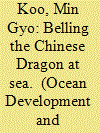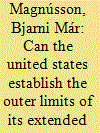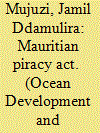| Srl | Item |
| 1 |
ID:
152205


|
|
|
|
|
| Summary/Abstract |
Against the backdrop of projections of either conflict escalation or legal settlement by Western international relations theories, this article provides a more nuanced and subtle balance between Western theories and Asian realities.
|
|
|
|
|
|
|
|
|
|
|
|
|
|
|
|
| 2 |
ID:
152202


|
|
|
|
|
| Summary/Abstract |
Although most provisions of the United Nations Convention on the Law of the Sea are regarded customary international law and the United States views most of its provisions as such, the outsider status of the United States causes problems in some areas, especially concerning the continental shelf beyond 200 nautical miles. This article asks whether it is possible for the United States to establish the outer limits of its continental shelf beyond 200 nautical miles in line with international law without becoming a state party to the convention, and if that is possible, how could the United States proceed?
|
|
|
|
|
|
|
|
|
|
|
|
|
|
|
|
| 3 |
ID:
152204


|
|
|
|
|
| Summary/Abstract |
The incorporation of Taiwan into the legal framework of regional fisheries management organisations (RFMOs) has proven to be challenging. This article reviews RFMO practice in this area in light of the recent experience of the Southern Indian Ocean Fisheries Agreement (SIOFA) and outlines some of the legal creativity that has provided solutions. Taiwan's participation in RFMOs is essential to the achievement of effective management outcomes. Accordingly, this article argues that today, with relevant international legal obligations and numerous suitable precedents, political considerations should not represent an obstacle to providing for fair and appropriate involvement of Taiwan in RFMOs.
|
|
|
|
|
|
|
|
|
|
|
|
|
|
|
|
| 4 |
ID:
152206


|
|
|
|
|
| Summary/Abstract |
In 2011 Mauritius adopted the Piracy and Maritime Violence Act (the Act). The Act does not expressly state that Mauritian Courts have jurisdiction over offenses committed outside of Mauritius. In Director of Public Prosecutions v Ali Abeoulkader Mohamed & Ors, the Mauritian Supreme Court dealt with the issue of whether the Act applied to non-Mauritius citizens where the alleged piracy acts had been committed outside of Mauritius on the high seas. This article assesses the Supreme Court's decision and suggest ways that the Act can be strengthened.
|
|
|
|
|
|
|
|
|
|
|
|
|
|
|
|
| 5 |
ID:
152203


|
|
|
|
|
| Summary/Abstract |
The recent award by an arbitral tribunal in a case brought by the Philippines against China gives lawyers reason to reexamine the historical evidence put forward by claimants in the South China Sea disputes. While the Tribunal was barred from considering territorial or boundary questions, it did cast doubt on the historical narrative rule that China has asserted in support of its claims. Fresh evidence from other sources also suggests that discussions of these matters need to move beyond arguments put forward in a small number of papers published more than thirty years ago. A close examination of the references used in those papers shows that they relied upon highly partisan Chinese sources. Recent historical research has produced new facts about the development of the competing territorial claims in the South China Sea, but international legal discourse has yet to take these findings into account. This article examines some of the key works in the field and calls for them to be reassessed and for future discussion of the disputes to be based upon verifiable and contextualized evidence rather than on nationalist assertions.
|
|
|
|
|
|
|
|
|
|
|
|
|
|
|
|